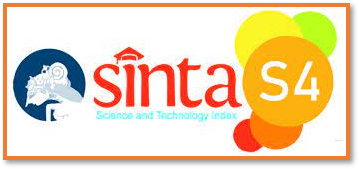Family Support Affect Bonding Attachment of Baby and Adolescent Mother
Abstract
Abstract
The transition to parenthood can be difficult for adolescent. The birth of a baby causes a fundamental challenge to the interaction structure that has been formed. Mothers have a very important role in improving health status, especially in terms of monitoring the growth and development of babies. Unpreparedness in carrying out her new role as a mother can cause frustration and perceive her baby as a nuisance and can be psychological disorders such as postpartum depression or postpartum blues, thereby reducing the bond between mother and baby. This study used a cross-sectional method with a purposive sampling technique on 106 respondents. The results of univariate analysis showed that the average age of teenage mothers was 18 years, marital status was married (90.56%), last education was high school (81.14%), the baby's temperament was difficult (66.9%) and the mother's psychosocial condition was not at risk (54%). Bivariate analysis shows that family support influences the bond between babies and adolescent mothers, with informational support of 86.1%, instrument support of 90%, emotional support of 76.5% and appreciation support of 78.2%. The results of this study it can be concluded, the good family support, can affect the better of bonding attachment between mother and baby.
Keywords: Adolescent Mothers, Family Support, Bonding Attachment
Full Text:
PDFReferences
PPN K. Child Marriage Report [Internet]. 2020. 2020. p. 44. Available from: https://www.unicef.org/indonesia/media/2851/file/Child-Marriage-Report-2020.pdf
Ahmed1&2 S, Khan A, Noushad S. Early Marriage; a Root of Current Physiological and Psychosocial Health Burdens. 2014;2(1):50–3. Available from: http://isindexing.com/isi/papers/1408357024.pdf
WHO. Early marriages , adolescent and young pregnancies Report by the Secretariat. Sixty-Fifth World Heal Assem. 2012;(March):16–9.
Imron A. Pendidikan kesehatan reproduksi remaja. Ar-Ruzz Media; 2012.
Acharya DR, Bhattaria R, Poobalan AS, Van Teijlingen E, Chapman GN. Factors associated with teenage pregnancy in South Asia: a systematic review. Heal Sci Jo [Internet]. 2010;4(1):3–14. Available from: http://eprints.bournemouth.ac.uk/12940/4/licence.txt
OGORI A., Fatima Ajeya S, YUNUSA A. the Cause and Effect of Teenage Pregnancy : Case of Kontagora Local Government Area in Niger State , Northern Part of Nigeria. Int Open J Educ Res. 2013;1(7):1–15.
Kinsey CB, Hupcey JE. State of the science of maternal-infant bonding: A principle-based concept analysis. Midwifery. 2013;29(12):1–14.
Moynihan M. Maternal attachment in close relationships, mother-infant postpartum bonding, and mentalization. 2014.
Muzik M, Bocknek EL, Broderick A, Richardson P, Rosenblum KL, Thelen K, et al. Mother-infant bonding impairment across the first 6 months postpartum: The primacy of psychopathology in women with childhood abuse and neglect histories. Arch Womens Ment Health. 2013;16(1):29–38.
Brockington I. Maternal rejection of the young child: present status of the clinical syndrome. Psychopathology. 2011;44(5):329–36.
Stiles AS. Case study of an intervention to enhance maternal sensitivity in adolescent mothers. JOGNN - J Obstet Gynecol Neonatal Nurs. 2010;39(6):723–33.
Khan SA. Baby steps: A bonding program for adolescent mothers and their infants. Diss Abstr Int Sect B Sci Eng [Internet]. 2013;74(2-B(E)):No-Specified. Available from: http://gateway.proquest.com/openurl?url_ver=Z39.88-2004&rft_val_fmt=info:ofi/fmt:kev:mtx:dissertation&res_dat=xri:pqm&rft_dat=xri:pqdiss:3539917%5Cnhttp://ovidsp.ovid.com/ovidweb.cgi?T=JS&PAGE=reference&D=psyc10&NEWS=N&AN=2013-99160-348
Riva Crugnola C, Ierardi E, Gazzotti S, Albizzati A. Motherhood in adolescent mothers: Maternal attachment, mother-infant styles of interaction and emotion regulation at three months. Infant Behav Dev [Internet]. 2014;37(1):44–56. Available from: http://dx.doi.org/10.1016/j.infbeh.2013.12.011
Brown LE, Brown L. a Comparison of Adolescent Mothers and Adult Mothers With Low Levels of Education By. 2011;
Puspasari J, Nur Rachmawati I, Budiati T. Family support and maternal self-efficacy of adolescent mothers. Enfermería Clínica. 2018 Feb 1;28:227–31.
Azmoude E, Jafarnejade F, Mazlom SR. The Predictors for Maternal Self-efficacy in Early Parenthood. J Midwifery Reprod Heal. 2015;3(2):368–76.
Plaza MB. Factors predicting maternal perceptions of child’s temperament in a group of African American and Dominican women at risk.... 2010.
Fatmawati A, Rachmawati IN, Buadiati T. Remaja Pada Masa Postpartum Dengan. Thesis Tidak dipublikasikan. 2016;
Tietz A, Zietlow A, Reck C. Maternal bonding in mothers with postpartum anxiety disorder: the crucial role of subclinical depressive symptoms and maternal avoidance behaviour. Women’s Ment Heal. 2014;17:433–42.
Leahy-Warren P, Mccarthy G, Corcoran P. First-time mothers: Social support, maternal parental self-efficacy and postnatal depression. J Clin Nurs. 2012;21(3–4):388–97.
Marmarosh CL, Markin RD, Spiegel EB. Attachment in group psycotherapy. 2013.
Stiles AS. Case study of an intervention to enhance maternal sensitivity in adolescent mothers. JOGNN - J Obstet Gynecol Neonatal Nurs. 2010;39(6):723–33.
Tomar S, PJ K, Munninarayanappa N. Attitude and Perception of Teenage Mothers Regarding Teenage Pregnancy. Int J Adv Res. 2017;5(5):231–9.
Huang CY, Costeines J, Ayala C, Kaufman JS. Parenting Stress, Social Support, and Depression for Ethnic Minority Adolescent Mothers: Impact on Child Development. J Child Fam Stud [Internet]. 2014;23(2):255–62. Available from: http://www.scopus.com/inward/record.url?eid=2-s2.0-84892484587&partnerID=tZOtx3y1
Jorge L. Pinzon, MD, Veronnie F. Jones M. Care of Adolescent Parents and Their Children. Pediatrics [Internet]. 2012;107(2):429–34. Available from: http://pediatrics.aappublications.org/cgi/doi/10.1542/peds.107.2.429
Bryanton J, Gagnon AJ, Hatem M, Johnston C. Predictors of Early Parenting Self-efficacy: Results of a Prospective Cohort Study. 2008;(57):252-259 10.1097/01.NNR.0000313490.56788.cd. Available from: http://journals.lww.com/nursingresearchonline/Fulltext/2008/07000/Predictors_of_Early_Parenting_Self_efficacy_.5.aspx
Jones L, Rowe J, Becker T. Appraisal, coping, and social support as predictors of psychological distress and parenting efficacy in parents of premature infants. Child Heal Care [Internet]. 2009;38:245–62. Available from: http://ovidsp.ovid.com/ovidweb.cgi?T=JS&PAGE=reference&D=emed9&NEWS=N&AN=2010064230
DOI: http://dx.doi.org/10.30872/j.kes.pasmi.kal.v6i2.10795
Refbacks
- There are currently no refbacks.
Indexing by :










